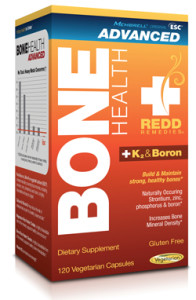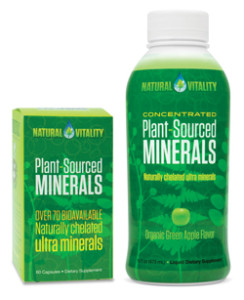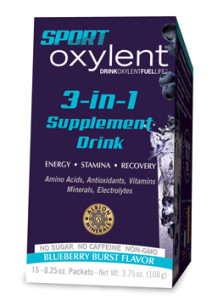While vitamins continue to grab headlines, the need for minerals is also vital to good health. Both vitamins and minerals each have a unique role in satisfying nutritional needs. But while both are critical in helping to maintain overall health, vitamins have long been the star attraction among consumers, in part, due to their shelf presence in stores and marketing push in the media. Minerals (both macrominerals and microminerals), such as calcium, magnesium, iron, copper and iodine, just to name a few, have long taken a backseat to their more popular counterpart but have critical roles to play in the body, including, help in bone and tooth formation, regulation of blood coagulation and proper heart function, as well as energy production and muscle contraction. In short, minerals are every bit as important as vitamins for proper nutrition and in helping to maintain and support an array of vital bodily functions.
“Minerals are the unsung heroes of nutrition,” said Gene Bruno, MS, MHS, VMS formulation, Twinlab (Hauppauge, NY). “The importance of minerals has often been overshadowed by the spotlight that vitamins have held in general, but the need for minerals is vital. In fact, they (minerals) were even recognized as essential to human nutrition long before vitamins were discovered.”
“Minerals are every bit as critical as vitamins to our body’s function, being involved in over 1,000 biochemical reactions,” added Jacob Teitelbaum, MD, director of the Practitioners Alliance Network. “They are critical for pretty much every function that we have, including function of the brain, energy production, heart and immune function, and pretty much anything else you can think of.”
Bruno also pointed out that the body can tolerate a deficiency to vitamins for a longer period of time than it can a deficiency of minerals. “A slight change in the blood concentration of important minerals may rapidly endanger life,” he said.
Vitamins, Minerals & Education
Many consumers looking for minerals or mineral supplements are familiar with the more popular ones, such as calcium and magnesium, but are often in need of guidance when it comes to getting exactly what they need to ensure the proper daily mineral intake.
“There is a lot of education that needs to be done in the area of minerals,” said Angelique Saffle, co-owner of Nature’s Marketplace Nutrition, North Bend, WA and president and founder of Bodyceuticals Calendula Skincare, Carnation, WA. “Most consumers know calcium, magnesium and iron … but beyond that they don’t really know what minerals are and why they are important to the body. As an industry we need more consumer education here.”
While eating a healthy diet remains the best way to to get both the vitamins and minerals needed on a daily basis, supplementation has now been pushed into the spotlight, as well as mineral depletion has become an industry issue that needs to be addressed.
“The industrialization of our food supply has played a significant role in the depletion of minerals in our diets,” said Stacey Littlefield, product formulator for Redd Remedies (Bradley, IL), maker of BONEhealth Original and BONEhealth Advanced supplements. “From the poor soil quality of chemically managed farms, to the over-processing of grains, minerals have seen stripped from our foods from the ground up. Adding fuel to the fire is the lack of fresh vegetables, fruits and whole grains in the standard American diet (SAD).
“These issues can be corrected by making some simple choices such as choosing organic produce whenever possible; incorporating fresh fruits, vegetables and whole grains into the diet; and supplementing the diet with multivitamin/mineral or mineral supplements.”

According to Teitelbaum, an unprocessed diet has approximately 600 mg a day of magnesium while the average SAD supplies about 275 mg daily and can contribute to a large increased risk of heart attack deaths.
“We have lost over half of the minerals in our diet because of food processing, with further losses coming from soil depletion from over-farming,” Teitelbaum said. “The farmers only give the plants what they need to grow, not what humans eating the plant need.”
Farming practices that result in mineral depletion have prompted some industry manufacturers like Natural Vitality (Austin, TX), makers of Plant-Sourced Minerals, naturally chelated ultra mineral supplements and liquid supplements, to support two non-profit organizations through its Calm Planet Project in order to address this pressing issue. “This will address how depletion can be corrected at the soil level so our plants contain higher levels of minerals,” said Ken Whitman, president of Natural Vitality. “Through the Bionutrient Food Association, thousands of growers have been trained in cost-effective techniques of growing nutrient-rich produce.”

Vitamins vs. Minerals
Vitamins are organic compounds that humans obtain from plants and animals. Minerals cannot be made in the body and must be obtained from an individual’s diet. They are inorganic and obtained from soil and water. Both vitamins and minerals are considered essential nutrients and work together to perform numerous key roles and functions in the body.
Approximately 4 percent of the body’s mass consists of minerals, which are divided into macrominerals, or major minerals and microminerals, sometimes referred to as trace minerals. The six major minerals required in excess of 250 mg per day include calcium, magnesium, potassium, phosphorous, sodium and chloride. Trace minerals are iron, zinc, selenium, iodine, fluorine and chromium.
Calcium and magnesium are necessary for the formation of bones and teeth, blood clotting and for normal muscle and nerve activity while magnesium also plays a role in the formation of bones and teeth and is necessary for normal functioning of muscle and nervous tissue. Iron is a part of the protein hemoglobin, which carries oxygen from place to place in the body. Iodine, copper, potassium, manganese, selenium and chromium also have major functions, and all are important to complete health.
While getting the proper intake of all minerals through proper diet and supplementation, special attention should be paid to magnesium, according to many experts, along with the often-lacking trace minerals.
“All minerals are important for good health,” said Bruno. “However, a special call-out should be given to magnesium due to insufficient intake. Although overt magnesium deficiency is not common, the U.S. Department of Agriculture (USDA), Agricultural Research Service, has reported that 57 percent of the U.S. population does not meet the recommended dietary allowance for levels of magnesium.”
Natural Vitality’s Whitman also pointed to the importance of magnesium in the diet, its desired intake balance with calcium and other minerals, and the role supplementation plays in bringing it all together. Some of the health benefits of magnesium include support for migraines, insomnia and depression, regulation of high blood pressure, support for cardiovascular health, and even studies that have suggested it can improve bone mineral density when supplemented with calcium.
“Supplementation affords the opportunity of remedying mineral deficiencies,” Whitman said. “Unfortunately, there is no broad agreement about the right balance of minerals. A prime example is calcium to magnesium ratio. Most manufacturers and many health care professionals recommend a 2-to-1 (calcium-to-magnesium) ratio.
“Probably the most effective thing retailers can do to help customers is to inform them of the need to balance calcium intake with magnesium. Many women have been told to take calcium supplements and may already have a high calcium diet from dairy products. Too much calcium can be detrimental to health and potentially lead to serious problems. Asking people who are buying supplements if they are also taking sufficient magnesium would be a compassionate service.”
“We consider magnesium to be one of the crucial minerals for human health,” added Redd Remedies’ Littlefield. “People simply don’t get enough magnesium in their diets. Trace minerals are equally as important, as it is these minerals that are the critical metallic core of necessary enzymes.”
“In order of priority, the most important minerals are magnesium, potassium, zinc, iodine and chromium,” offered Teitelbaum. “Iron should only be supplemented if blood testing shows the need. Trace minerals are also critical.”
Supplements & the Customer
According to USDA data, only 10 percent of Americans are following dietary guidelines, meaning that most are not receiving adequate amounts of micronutrients, including minerals. This again is where supplementation can again be front and center.
“Without supplementation, it is almost impossible to get adequate, let alone optimal amounts of all the minerals needed,” Teitelbaum said. “Taking them all as individual tablets is not an attractive solution as there an be handfuls of pills, and therefore would be getting amounts that are imbalanced. There is a nutrition primer that gives the optimal amounts for supplementing each mineral that should be used,” he added.
Twinlab’s Bruno noted that according to the goals of nutrient intake established by the USDA, when comparing the nutritional goals for Americans to the nutrient content of foods consumed in a 2,000 calorie-per-day diet, there will be insufficient amounts of magnesium and potassium. “So even if you follow dietary guidelines you won’t be reaching 100 percent of your nutrient intake goals,” he said.
“Supplementation can play a key role in making sure that individuals are getting a balanced intake of minerals in the diet,” added Littlefield. “Most natural-channel multivitamin-mineral supplements have all the key macro- and micro-minerals essential to health. If an individual wants more targeted mineral supplementation, he or she can choose calcium and magnesium supplements for bone health or magnesium and potassium supplements for muscle health.”
Of course, with supplementation comes customer inquiry and often customer confusion regarding just which mineral supplements are right to take. There is also the question of which delivery method (i.e, capsules, liquids, chewables, etc.) may be the best option for that particular individual. Coral LCC (Carson City, NV), for example, has launched Coral Chewables, offering the benefits of coral minerals in a chewable, Bavarian Cream-flavored tablet, with 500 mg of calcium and 73 other minerals from coral. Recommending the right delivery method is where the natural product retailer must play the role of educator.
“It’s vital that our store team members are educated about minerals,” said Saffle, who noted that her store dedicates a good amount of shelf space to minerals, with the most popular being calcium and magnesium. “Minerals play such a critical role in optimal health of our body. Minerals themselves, and the role they play in good health, are generally easy to explain and understand. The more confusing and difficult thing to explain is the many different forms of minerals and how to differentiate their quality, absorption, and efficacy. This is where retailers play a crucial role, working on the front lines with customers every day. With so much to learn and keeping busy in our stores, this is where we appreciate our manufacturers who can provide cutting-edge education in this area.”
One of the manufacturers Saffle points to as a leader in minerals education is Vitalah (Watsonville, CA), maker of Oxylent and Sport Oxylent, a 3-in-1 supplement drink that contains a blend of vitamins C, D, B6 and B12 along with a host of Albion minerals.

As far as delivery methods go, that is usually left to the customer to decide, depending on individual preferences, or sometimes issues with swallowing pills or simply not enjoying a supplement-based drink. Is there really a difference that consumers need to be aware of? The key, more experts agree, is absorption.
“We believe in liquid as the best delivery method,” said Natural Vitality’s Whitman. “All pills and capsules need to become liquefied in order to absorb. “If you begin with liquid or water-soluble powder your are beginning with a bioavailable solution.”
“Absorption is key,” added Saffle. “We suggest our customers learn about chelated minerals and why they offer such high bioavailability. The most important thing to know and to get across is how difficult it is for our bodies to absorb minerals in the forms they are found in our food and in typical supplements. Even in optimal conditions, minerals are only moderately well absorbed. The process of chelation transforms minerals from the inorganic form that is difficult to absorb into the organic form that is much more readily absorbed and metabolized by our bodies.”
Bluebonnet Nutrition (Sugar Land, TX) recently introduced a line of Albion minerals, Chelated Magnesium Bisglycinate capsules that provide 200 mg of elemental magnesium per serving in a more bioavailable bisglycinate form, to support heart health and other key functions.
“The best way to absorb minerals is to take an amino acid chelate forms of those nutrients,” said Trisha Sugarek MacDonald, BS, MS, director of research and development and national educator at Bluebonnet. “The reason for this is simply because when a mineral is taken as a non-chelated form it is vulnerable to being rendered useless by food components such as oxalates, phytates, fatty acids and more. When minerals are chelated to aminos they are strong enough to survive the pH of the gut, but weak enough to be absorbed by the small intestine through active transport, making them more bioavailable and bioactive. And once absorbed they are essentially whole food nutrition since you not only have the benefit of the minerals but also the amino acids. So it’s a win-win.”
According to Bruno, the best way to absorb the minerals needed on a daily basis is to take a good mineral supplement from a reputable supplement company. As for delivery methods, he indicated that, “popular delivery methods include capsules and tablets, although some liquid supplements are available, and alternative delivery methods, such as gummies are popping up, although they are not necessarily better for absorption than capsules.”
Too Much
While heeding the warning against not getting enough minerals is paramount to overall health and well-being, there is also some concern that getting too much of a good thing can also be a danger.
“You can always get too much of a good thing,” said Bluebonnet’s Sugarek MacDonald. “The dangers of excess mineral intake are numerous and vary depending on the mineral that is over consumed. Minerals function throughout the cells and tissues of the human body to maintain health, but taking in excessive levels of these nutrients can be detrimental to the body’s well-being.”
That’s why getting a good balanced form is very important, according to Teitelbaum, in order to avoid potential health risks. “Taking plain calcium tables can be associated with a 31 percent risk of heart attack. This is why they need to be combined with vitamin D, magnesium and vitamin K.” “It’s possible to get too many minerals on a daily basis,” added Littlefield. “It’s easier to do this with the microminerals. Chromium, for example, has limits as to the amounts beneficial for health. Once we go over that threshold, it can begin to cause problems in the body.
Also, large amounts of iron should be taken away from calcium because they compete with one another for absorption.” While proper intake must be adhered to, Bruno suggested that this should not scare off consumers from getting the minerals they need. “It is certainly possible to get too much of any mineral, but if people stick reasonably close to the Daily Value levels, there is not likely to be a problem.” VR
For More Information:
Bluebonnet Nutrition, (800) 580-8866, www.bluebonnetnutrition.com
Coral LCC, (800) 678-9884, www.coralcalcium.com
Natural Vitality, (800) 446-7462, www.naturalvitality.com
Redd Remedies, (888) 453-5058, www.reddremedies.com
Twinlab, (800) 645-5626, www.twinlab.com
Vitalah, (877) 699-5368, www.iherb.com/Vitalah













